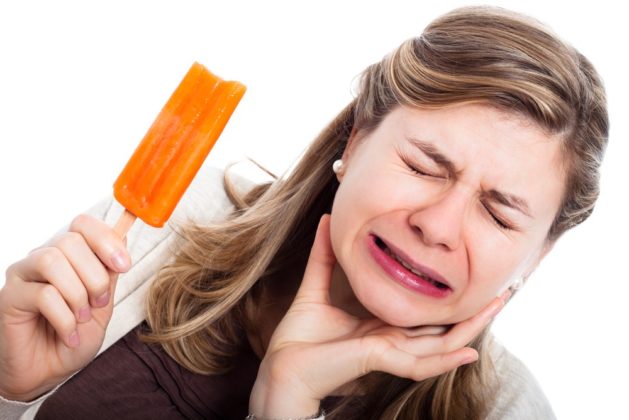According to the Academy of General Dentistry, tooth sensitivity affects more than 40 million adults in the United States alone. Tooth sensitivity is temporary but very uncomfortable, it involves sharp and sudden pain in the teeth that sometimes shoot into the nerve endings.
People with tooth sensitivity experience difficulties in performing simple daily tasks such as brushing teeth or even enjoying the morning cup of hot beverage or that cold refreshment that you would otherwise enjoy delightfully.
Of concern to everybody is that tooth sensitivity can occur to anyone regardless of age and gender. This occurs when the dentin is exposed as a result of thinning of the enamel or the occurrence of gum recession.
The good news is that you can manage the condition and improve your oral health according to Leslie Seldin, DDS an associate professor of dentistry at the Columbia University College of Dental Medicine
Why Does Teeth Sensitivity Occur?
Teeth sensitivity also referred to as “Dentin Hypersensitivity” occurs when your tooth underlayer becomes exposed, this occurs as the enamel (hard protective layer of your tooth) becomes thin, cracked or develops a cavity, this might be due to receded gums, periodontal disease, acidic diets, abrasive toothpaste or hard toothbrush bristles among others, leaving dentin of the root exposed.
What causes tooth sensitivity?
1. Some Toothpaste and mouthwash
Toothpaste with teeth whitening attributes has become common as people seek that perfect smile, however, this might be the cause of your teeth sensitivity. Teeth whitening toothpaste contains chemicals such as carbamide or hydrogen peroxides that repeated uses cause tooth sensitivity. You should also note that the stronger the solution you use the higher the likely hood of tooth sensitivity.
2. Acidic foods
Your love for soda and other acidic foods such as grapefruit and candy might just be the cause of your tooth sensitivity, they attack the enamel thinning it over time.
The saliva has a natural mechanism to deal with acidity, but you shouldn’t overwork it. you can reduce chances of having teeth sensitivity by substituting the acidic foods with not acidic ones and also taking plain-yogurt, cheese or milk to protect yourself.
3. Gum diseases
Gum condition such as receding gums wears away the gum tissues surrounding the teeth thus forming gaps between the teeth and gums promoting the build-up of bacteria exposing the dentin, therefore, causing teeth sensitivity. Receding gum is particularly common in people suffering from periodontal disease.
4. Grinding your teeth
While this might be involuntary, teeth grinding overtime wears away your enamel regardless of the enamel being considered as the strongest substance on your body. Habitual teeth clenching and grinding leads to teeth sensitivity as the enamel is worn away.
5. Teeth sensitivity after filling
You might experience sensitivity on your tooth after having that cavity filled, this is according to researchers at Columbia College of Dental Medicine. the filling procedure while beneficial, it causes sensitivity. But this is temporary and fade away on its own within a few weeks.
Another cause of sensitivity after a visit to your dentist is composite fillings, this sort of sensitivity is different as the subject only experiences pain when chewing, however, no pain is experienced when clenching teeth together.
6. Brushing habits
A leading cause of sensitive teeth is how you brush your teeth, using too much force can wear away your enamel, this is worse if the bristles on your toothbrush are hard. They scratch the enamel further encouraging gum recession and/or exposure of the enamel leading to sensitivity.
7. Mouthwash
Overuse of mouth wash with whitening, chemicals corrodes the teeth enamel leading to tooth sensitivity.
TOOTH SENSITIVITY TREATMENT
When examining the root cause of your teeth sensitivity, your dentist might use a nasal mask, according to the need. The nasal mask sedates you safely without exposing the staff to harmful leakage. The dentist can now perform any procedures to treat the sensitive teeth.
Other home treatments include:
-Rinsing your teeth with salt
-Massaging your teeth with turmeric
-Drinking green tea, it helps reduce inflammation and strengthen teeth
-Brushing your teeth with desensitizing toothpaste
HOW TO AVOID TOOTH SENSITIVITY
1. Replacing your hard-bristled toothbrush with a softer one, also avoid worn-out toothbrushes and replace your toothbrush every 3 months as recommended by dentists.
2. Using desensitizing toothpaste, there are many brands of desensitizing toothpaste in the market, they work by making your teeth feel less painful while brushing preferably twice a day for best results. they also contain fluoride that helps prevent future teeth decay.
3. Avoid brushing your teeth too hard as you might be causing more harm than good to your teeth. improve also on your brushing technique, brushing from side to side on your gum line cause it to disappear faster. brush from up to down at an angle of 45 degrees to effectively clean your teeth and leaving them strong.
4. Avoid acidic foods if you can or try reducing their intake,
5. Stop grinding your teeth away, you can do this by managing your stress. Unclenching your teeth may however not be in your control, you could check with a dentist to fit you with a splint or a mouth guard. if all else fails, your teeth clenching might be severe and additional dental positioning is necessary, the dentist may also recommend a muscle relaxant
6. Get to the root of the problem; some causes of tooth sensitivity be as a result of an underlying issue
a. Gum disease: This destroys the bony part of the teeth, in this case, your dentist might do a thorough cleaning of your teeth scraping tartar and plaque below your gum line, in worse cases surgery might be performed.
b. A cracked tooth: The dentist’s solution to this depends on the depth of the crack. If the crack is below your gum line, the entire tooth will have to be removed, if it’s above the gum, it will only need filling.






Leave a comment